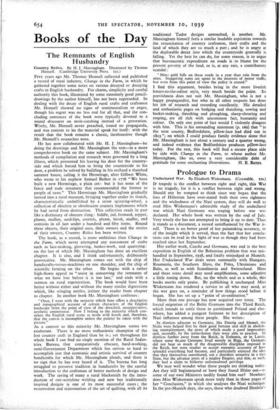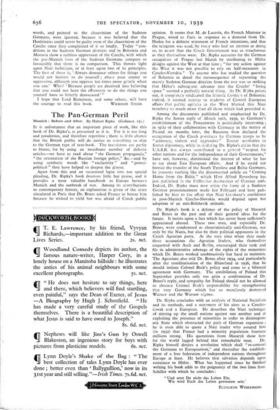Prologue to Drama
Undeclared War. By Elizabeth Wiskemann. (Constable. 128.) IF tragedy is the conflict between right and right, this War is no tragedy, for it is a conflict between right and wrong.
Should any be tempted to think since war began that the foes of Hitlerism have over-stated both their own rightness and the wickedness of the Nazi system, they will do well to read Miss Wiskemann's admirable study of the undeclared war which Nazi Germany was waging before war was
declared. Her whole book was written by the end of July. Very wisely she has not attempted to bring it up to date. Thus it stands as a document, a record uninfluenced by the War it- self. There is no better proof of her painstaking accuracy, or of the insight which it served, than the fact that her conclu- sions can be read in the light of war as though they had been reached since last September.
Her earlier work, Czechs and Germans, was and is the best
exposition in English of the Bohemian problem that was mis- handled in September, 1938, and fatally misjudged at Munich.
Her Undeclared War deals more summarily with Hungary, Roumania, the Southern Slays, the Poles, Ukrainians and Baits, as well as with Scandinavia and Switzerland. Here and there some detail may need amplification, some adjective
a little toning down. But, on the whole and as a whole, this books merits only praise. By publishing it unchanged Miss Wiskemann has rendered a service to all who may need, as the war goes on, a reminder of how things stood before it began. She has set up a " point of co-ordination."
More than one passage has now acquired rare irony. The forced migration of the Baltic Germans into the Third Reich, which intends to settle them in partitioned Poland and else- where, has added a pungent footnote to her description of Nazi influence among these people. She writes :
In districts adjacent to Germany, like Danzig and Memel, the Nazis were helped first by their good fortune and skill in abolish- ing unemployment, the news of which made a good impression; and, secondly, by the intimidation they were able to practise. In districts farther away from the Reich, in Esthonia, or in Latvia, where some 6o,000 Germans lived mostly in Riga, the Germans did not hear so much of the disagreeable discipline imposed in the Reich, but were readier to accept romantic accounts of how splendid everything had become, and particularly enjoyed the idea that they themselves constituted, not a dissident minority in a tiny State, but the advance posts of a mighty Empire, and that, as such, they had a claim to hitherto unformulated privilege.
We may well wonder what these people are thinking today. Are they still beglamoured or have they found Hitler out—as some of our own-Ministers tardily found hirn out? Nowhere does Miss Wiskemann speak more truly than in those pages of her " Conclusion," in which she analyses the Nazi technique.
In the pre-Munich days, she says, those who doubted Henlein' words, and pointed to the chauvinism of the Sudeten Germans, were ignored, because it was believed that the Henleinists could never be guilty even of the chauvinism of the Czechs since they complained of it so loudly. Today " con- ditions in the Sudeten German districts and in Bohemia and Moravia show a ruthless oppression of the Czechs, with which the pre-Munich lives of the Sudeten Germans compare so favourably that there is no comparison. This throws light upon Nazi technique, or at least upon two of its principles. The first of these is, ' Always denounce others for things you would not hesitate to do yourself ; abuse your enemy as oppressive, although you oppress ten times more grimly when you can.' Why? ` Because people are deceived into believing that you could not have the effrontery to do the things you yourself have so bitterly denounced.' " I hope that Lord Runciman, and some others, will have
the courage to read this book. WICKHAM STEED.





































 Previous page
Previous page